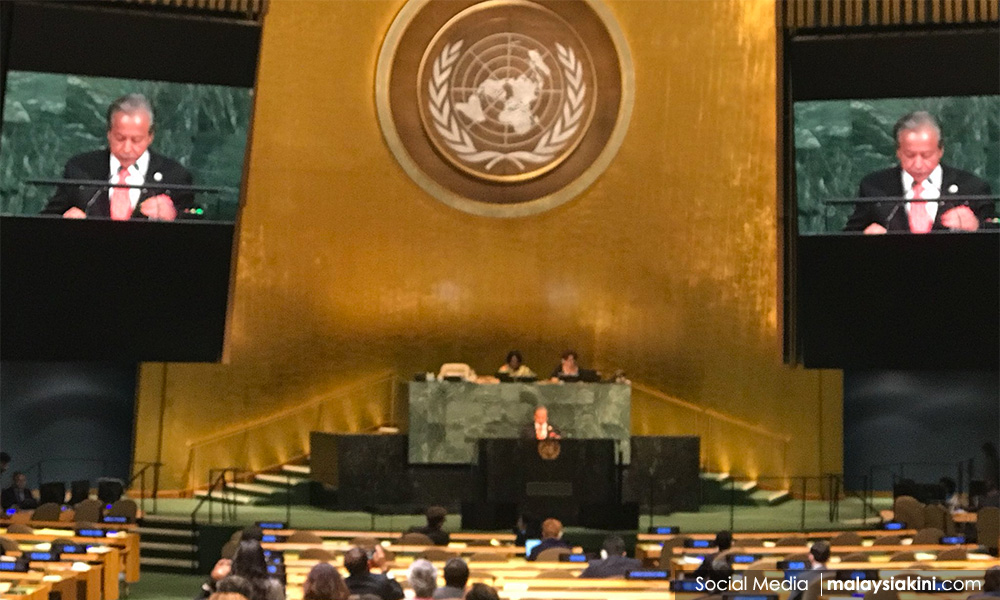MP SPEAKS | I will be submitting a Parliamentary Question for Minister’s Question Time on October 24, 2017 to give Foreign Minister Anifah Aman the first available opportunity to explain why Malaysia failed in its bid to be elected to the United Nations Human Rights Council.
Created by the Assembly in March 2006 as the principal United Nations body dealing with human rights, the Human Rights Council comprises 47 elected Member States. On the basis of equitable geographical distribution, Council seats are allocated to the five regional groups as follows: African States, 13 seats; Asia-Pacific States, 13 seats; Eastern European States, 6 seats; Latin American and Caribbean States, 8 seats; and Western European and other States, 7 seats.
There were five candidates contesting the four Asia-Pacific seats on the Council. The election was conducted by secret ballot at the General Assembly. Nepal topped the Asia-Pacific group with 165 votes followed by Qatar with 155, Pakistan, 151, Afghanistan, 130 and Malaysia, 129.
It is shocking that Malaysia failed in its diplomatic effort and Parliament deserves to know what had happened.
Anifah should also disclose in Parliament how much it cost Malaysia to lobby and campaign for the position.
Malaysia was an active member of the Commission on Human Rights during the periods 1993-1995, 1996-1998, 2001-2003 and 2005-2006 before the Commission was dissolved. Thereafter, Malaysia was elected to the newly established Human Rights Council for the term 2006-2009, and subsequently for the term from 2010-2013.

According to the filing made by Malaysia’s Permanent Mission to United Nations in January this year, the government of Malaysia made the following pledges and commitments:
“If elected to the Human Rights Council, Malaysia pledges to:
- Engage constructively in the evolving modalities of work of the Human Rights Council to further enhance its role as a strong, fair, effective, efficient and credible institution entrusted with the promotion and protection of human rights worldwide and fundamental freedoms for all;
- Continue to support the work of the Office of the United Nations High Commissioner for Human Rights (OHCHR);
- Continue its active participation in the norm-setting work of the Human Rights Council;
- Nurture a spirit of cooperation within the Human Rights Council, based on the principles of mutual respect and dialogue, free from acrimony and politicisation;
- Promote greater coherence between the work of the Human Rights Council with other United Nations agencies and mechanisms in achieving internationally agreed targets and goals; and,
- Actively support international action to advance the rights of vulnerable groups such as women, children and persons with disabilities.
Towards fulfilling these pledges, Malaysia is committed to:
- Deepening cooperation at the international level in supporting the work of various United Nations actors and mechanisms involved in the promotion and protection of human rights, such as OHCHR; the special procedures of the Human Rights Council; the United Nations Development Programme; the United Nations Population Fund; the United Nations Entity for Gender Equality and the Empowerment of Women (UN-Women); the United Nations Children’s Fund; the Office of the United Nations High Commissioner for Refugees; the former International Research and Training Institute for the Advancement of Women (now merged with UN-Women); and the United Nations Environment Programme;
- Upholding the principles of dialogue and cooperation among all stakeholders in furthering the promotion and protection of human rights for all peoples;
- Supporting and implementing the 2030 Agenda for Sustainable Development, particularly with regard to realizing the right to development, including by supporting ongoing efforts aimed at its operationalisation and implementation;
- Sharing best practices, experiences and achievements on the realisation of human rights, including advancing the rights of women, children and persons with disabilities, and on poverty eradication, health and education, with interested partners;
- Engaging constructively with all stakeholders to ensure that the international community continues to create a supportive external environment towards the creation of economic stability, shared prosperity and equitable gains from globalisation;
- Engaging continuously with all stakeholders to assess and monitor the implementation of recommendations from the universal periodic review process;
- Working continuously at the regional level with its partners under the Asean framework, and in particular with the Asean Intergovernmental Commission on Human Rights in the promotion of human rights in the region; and,
- Continuing to support the role and function of the National Human Rights Commission of Malaysia (Suhakam), including activities being implemented such as educating the public on human rights;
Intensifying efforts to raise human rights awareness among all segments of the population, including law enforcement officials, members of the judiciary, government officials and other stakeholders.”
LIEW CHIN TONG is the MP for Kluang and DAP national political education director.
The views expressed here are those of the author/contributor and do not necessarily represent the views of Malaysiakini.

